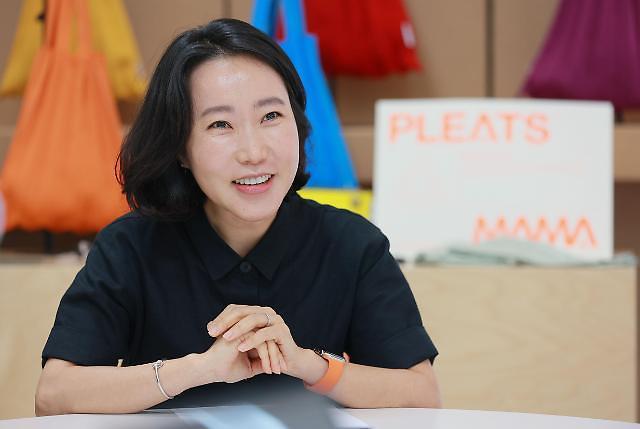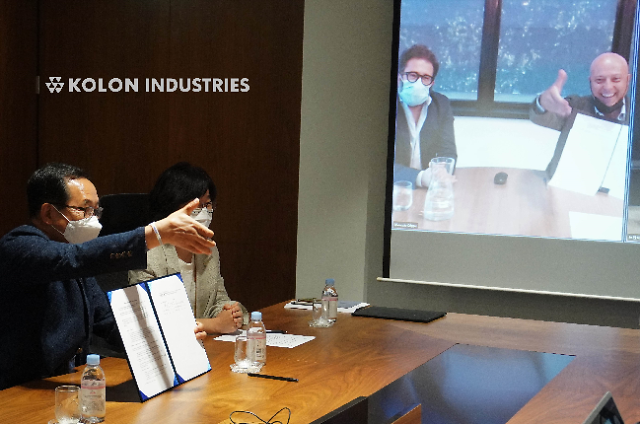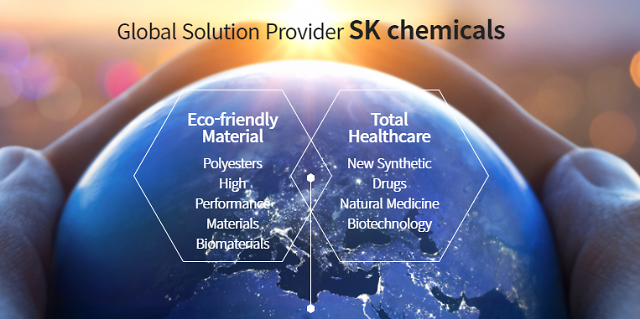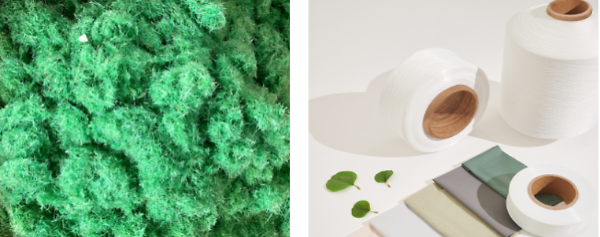이미지 확대

[Photograph by Yoo Dae-gil]
Pleats Mama founder and CEO Wang Jong-mi gave positive connotation to her business saying her company has played a role in expanding the scope of recycling to marine waste. Since Pleats Mama was established in 2017, the company has consumed 1.85 million waste polyethylene terephthalate (PET) bottles.
At the beginning, Wang was able to attract consumers with a stylish and functional wrinkle bag brand called "Knit Pleats" which is foldable and easy to carry. Each bag consumes 16 500-milliliter PET bottles. Instead of cutting and sewing woven fabrics in batches, Knit Pleats bags are molded one by one, cut into desired shapes and knitted with detailed linking and meticulous hand sewing.
"It depends on technology to see if wrinkles are completely straightened when folded and unfolded. Our technology team has worked on thread mixing technology for a year to realize excellent wrinkle resiliency," Wang said, adding she has adopted "pretty" design to survive in the highly competitive fashion industry. "Pleats Mama is a fashion brand after all. I put all my energy into preferred design."
By making use of her experience as a designer at a sweater original equipment manufacturer (OEM) company, Wang has been directly involved in designing and put up the slogan, "A pet bottle I threw away is born into a bag." The company goes beyond recycling and upcycling to communicate with customers by presenting a virtuous cycle of value consumption with "Me-cycling." Upcycling, also known as creative reuse, is the process of transforming by-products, waste materials, useless, or unwanted products into new materials or products perceived to be of greater quality.
The eco-friendly clothing business is still at an early stage in South Korea, while it has established a firm position in some foreign countries, Wang said, pointing to U.S. sportswear company Nike and H&M, a clothing retail company based in Sweden. "Although related markets are growing in South Korea, there are only a few brands like Pleats Mama, which are trying to achieve an eco-friendly process from production to distribution."
Wang thinks that the wider introduction of environmental, social, and corporate governance (ESG), a trendy corporate operation method that focuses on the use of green energy and environmentally-friendly management, will act as a boon to her business as ESG creates the trend of value consumption, with more countries and companies concentrating their capital on establishing a resource circulation system.
Wang aims to achieve double-digit growth this year based on a friendly environment. To maintain growth momentum, she would introduce new premium products in September following steps in March to become a lifestyle brand by expanding a lineup of products to "one-mile wear" such as leggings. One-mile wear is a concept based around comfortable clothing that is worn within a one-mile radius of home.
Pleats Mama cannot be free from an overall business slump in the fashion industry. However, Wang stood firm in her faith that her company would grow up with customers. "The fashion industry is faster in becoming a red ocean than any other industry. The illusion that entry barriers seem relatively low is also a reason why it fast becomes a red ocean. Sincerity is important in the fashion industry and only brands that grow up and agonize with customers can survive."
Wang emphasized the systematic protection of eco-friendly products, voicing concern about "green sheen", which is a form of marketing spin in which green public relations and green marketing are deceptively used to persuade the public that an organization's products, aims and policies are environmentally friendly. "It's regrettable to see the emergence of greenwashing cases. It is difficult for ordinary people to distinguish between real and fake eco-friendly products. We need to protect consumers by strengthening eco-friendly certification systematically."
Wang sees high costs as another task to overcome because eco-friendly products inevitably cost more due to recycling. "Many consumers ask why recycled products are so expensive," she said, vowing to win over consumers with "story and design."
Wang's business began in 2017 when she tied up with Hyosung TNC to utilize Regen, an eco-friendly polyester fiber from recycled PET bottles to manufacture clothes, bags, shoes, and other products. Hyosung TNC has worked with a provincial government to produce a nylon fiber recycled from waste fishing nets and is involved in a pilot project launched by the southern port city of Busan in May to recycle discarded fishing nets into high-quality materials that can be used for the production of sustainable eco-friendly fabrics.
The amount of waste fish nets generated in South Korea stands at 44,000 tons per year. The government has launched a campaign to use biodegradable fishing nets and prevent ghost fishing that damages fish stock. Sometimes divers get caught up in ghost nets and lose their lives. Ghost nets can destroy underwater habitats such as coral reefs and benthic fauna, which are common spawning grounds for marine animals.
About 50 percent of ocean waste in South Korea is composed of fishnets and buoys made of plastic. A recycling center will be built at Tongyeong by the end of 2022 to break down plastic ocean waste including plastic fishnets, Styrofoam buoys and vinyl into fuel oil by using a pyrolysis process.
(This story is based on an interview conducted by Aju Business Daily reporter Lee Bo-mi)
Copyright ⓒ Aju Press All rights reserved.




View more comments